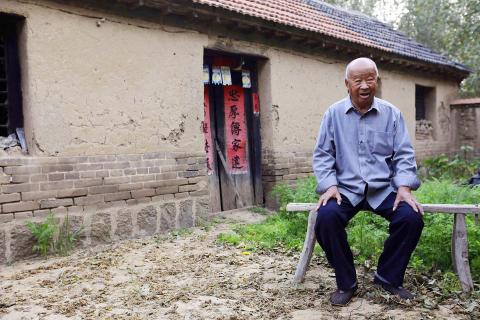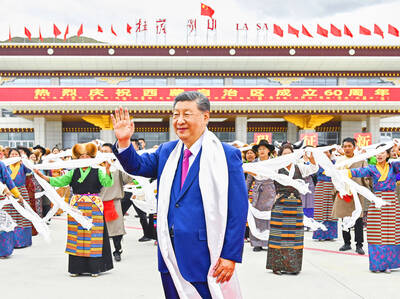On a brisk day in the middle of this month, Nobel Prize in Literature winner Mo Yan’s (莫言) 62-year-old brother, Guan Moxin (管謨欣), stands outside their childhood home in Pingan Village, Shandong Province, posing for photographs with a steady stream of brightly dressed tourists. He smiles as a teenage girl in a pink sweater puts her hand on his shoulder and flashes a peace sign at the camera.
“Everybody wants to understand what Mo Yan’s life used to be like, when we were young,” says Guan, leading a small crowd inside the abandoned house to a room where Mo, now 57, was married. A broken antique radio — a wedding gift, Guan says — sits on a crumbling concrete bed, untouched for decades.
Pingan, population 800, may soon be hard-pressed to maintain its rusticity.

Photo: Reuters
Authorities in Gaomi, the municipality that administers Pingan, plans to build a US$107 million “Mo Yan Culture Experience” theme park around the writer’s old home, according to the Beijing News.
The plan adds a touch of avarice to the range of reactions with which China has received Mo’s Nobel victory. The author has worked with the Chinese Communist Party (CCP) for decades — many outspoken dissidents were outraged by the award. However, for many ordinary Chinese the prize was a sign that China’s cultural influence may now rival its economic clout. For Gaomi city officials, it could prove to be a gold mine.
Inspired by Mo’s 1997 novel Red Sorghum, which Zhang Yimou (張藝謀) adapted into an award-winning film, the government also plans to create a Red Sorghum Culture and Experience Zone in Pingan. Although villagers counter that they stopped growing the cereal in the 1980s, the government is reportedly planning to pay local farmers to plant 650 hectares of the unprofitable crop.
The Gaomi press center director, Wang Youzhi (王有志), told the official Xinhua news agency that the theme park was more a “vision” than a concrete plan.
“Although the idea sounds promising, we have yet to take the whole situation into consideration,” he said.
“This might be the regulatory commission’s long-term plan over five or 10 years,” he added.
However, a large-scale tourism project in Gaomi remains unsurprising, analysts claim. According to Tao Ran (陶然), an economics professor at Renmin University in Beijing, local governments often borrow massive sums of money from state-owned banks to finance expensive development projects, hoping that they will drive up the value of local property.
“If you go to almost any Chinese county or city, you’ll see that they’re building new cities, new industrial parks and new theme parks every day,” Tao said.
In July authorities announced a 810 hectare, US$4.6 billion Tibetan Culture theme park, currently being developed on the outskirts of Lhasa. Last week officials in the Xinjiang Uighur Autonomous Region unveiled plans to build a US$1 million Malan Military Expo Park at China’s first atomic bomb test site.
Mo’s brother, neighbors and 90-year-old father say they have not heard of plans for a theme park.
“It’s impossible that the government here would spend so much money on such a surface thing,” Guan said.
Mo Yan, who was born Guan Moye (管謨業) — his pen name means “don’t speak” — could not be reached for comment.
Gaomi residents are intensely proud of their Nobel laureate, whom they refer to as “Teacher Mo Yan.” Long red banners congratulating Mo hang from the sides of concrete homes along major thoroughfares.
“Mo Yan’s works have elements from Gaomi’s culture,” said Mao Weijie (毛維杰), who oversees a government-affiliated Mo Yan museum in a local high school. “He writes about Gaomi paper-cutting, for example, and sometimes he writes using our Gaomi dialect.”
The Nobel Prize committee praised Mo for his “hallucinatory” writing in the vein of William Faulkner and Gabriel Garcia Marquez. Yet in China much of the discussion surrounding Mo’s prize is less related to his works’ literary merit than his relationship with the authorities.
A longtime CCP member, Mo began writing in 1981 while serving with the People’s Liberation Army. He is now the vice-chairman of the official China Writers’ Association and receives his salary from the Culture Ministry. Authorities welcomed his win with breathless commentaries in the state-run press.
Outspoken dissidents have chastised Mo for keeping his head down and toeing the party line. Artist Ai Weiwei (艾未未) called the Nobel committee’s decision an “insult to humanity and to literature.”
Yet Mo’s works show an undeniable capacity for sharp-edged criticism. Many involve subjects such as corruption, the tragedy of the Cultural Revolution and forced abortions under the country’s one-child policy.
In Pingan the atmosphere is still more celebratory than soul-searching.
Guan Yifan (莫貽凡), Mo’s father, said Mo did not come back home often, but when he does, “we just talk about what’s happening in our home — how the tomatoes are growing, that type of thing.”
Inside the house faded family pictures hang on newspaper-covered walls; outside, the courtyard overflows with shucked corn.
Although Guan says that he has never read his son’s books, he is proud of Mo’s achievements.
“We’re all just happy,” he says. “Very, very happy.”

Ten cheetah cubs held in captivity since birth and destined for international wildlife trade markets have been rescued in Somaliland, a breakaway region of Somalia. They were all in stable condition despite all of them having been undernourished and limping due to being tied in captivity for months, said Laurie Marker, founder of the Cheetah Conservation Fund, which is caring for the cubs. One eight-month-old cub was unable to walk after been tied up for six months, while a five-month-old was “very malnourished [a bag of bones], with sores all over her body and full of botfly maggots which are under the

BRUSHED OFF: An ambassador to Australia previously said that Beijing does not see a reason to apologize for its naval exercises and military maneuvers in international areas China set off alarm bells in New Zealand when it dispatched powerful warships on unprecedented missions in the South Pacific without explanation, military documents showed. Beijing has spent years expanding its reach in the southern Pacific Ocean, courting island nations with new hospitals, freshly paved roads and generous offers of climate aid. However, these diplomatic efforts have increasingly been accompanied by more overt displays of military power. Three Chinese warships sailed the Tasman Sea between Australia and New Zealand in February, the first time such a task group had been sighted in those waters. “We have never seen vessels with this capability

A Japanese city would urge all smartphone users to limit screen time to two hours a day outside work or school under a proposed ordinance that includes no penalties. The limit — which would be recommended for all residents in Toyoake City — would not be binding and there would be no penalties incurred for higher usage, the draft ordinance showed. The proposal aims “to prevent excessive use of devices causing physical and mental health issues... including sleep problems,” Mayor Masafumi Koki said yesterday. The draft urges elementary-school students to avoid smartphones after 9pm, and junior-high students and older are advised not

Chinese President Xi Jinping (習近平) attended a grand ceremony in Lhasa yesterday during a rare visit to Tibet, where he urged “ethnic unity and religious harmony” in a region where China is accused of human rights abuses. The vast high-altitude area on the country’s western edge, established as an autonomous region in 1965 — six years after the 14th Dalai Lama fled into exile — was once a hotbed for protest against Chinese Communist Party rule. Rights groups accuse Beijing’s leaders of suppressing Tibetan culture and imposing massive surveillance, although authorities claim their policies have fostered stability and rapid economic development in